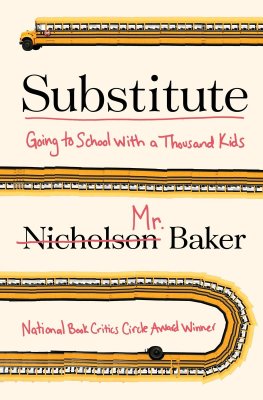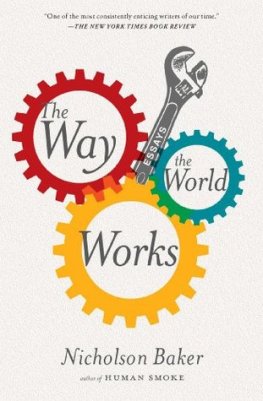Acclaim for NICHOLSON BAKERS
The Size of Thoughts
A trove of treasures large and smallopulent ingenious.
San Francisco Chronicle
There are extravagant delights here. Its as if S. J. Perelman had been put in charge of the whole Humanities syllabus.
The New York Review of Books
Whole bushel baskets of perceptions, engaging and quirky, each and all. A fine, surprising, pungent, playful and thought-provoking bouquet of a book.
Los Angeles Times Book Review
Baker is an utterly idiosyncratic, artistically adventurous, passionately intellectual writer. He notices things that no one else notices, and he articulates what he notices extraordinarily well. He writes heart-stopping sentences and hes hilariouswhat more are we supposed to ask for?
Village Voice
Always funny. Bakers talent can turn not only dross but actual deadwood into gold.
Newsday
Books by NICHOLSON BAKER
The Mezzanine
Room Temperature
U and I
Vox
The Fermata
The Size of Thoughts
NICHOLSON BAKER
The Size of Thoughts
Nicholson Baker was born in 1957 and attended the Eastman School of Music and Haverford College. He is the author of four novelsThe Mezzanine (1988), Room Temperature (1990), Vox (1992), and The Fermata (1994)and one work of nonfiction, U and I (1991), in addition to The Size of Thoughts. His essays have appeared in The New Yorker, The Atlantic Monthly, The New York Review of Books, Esquire, and The Best American Essays. He is married with two children.
FIRST VINTAGE BOOKS EDITION, MARCH 1997
Copyright 1982, 1983, 1984, 1989, 1991, 1992, 1993, 1994, 1995, 1996 by Nicholson Baker
All rights reserved under International and Pan-American Copyright Conventions. Published in the United States by Vintage Books, a division of Random House, Inc., New York, and simultaneously in Canada by Random House of Canada Limited, Toronto. Originally published in hardcover by Random House, Inc., New York, in 1996.
The following pieces were first published in periodicals: Changes of Mind, The Size of Thoughts, and Rarity in The Atlantic Monthly; Ice Storm, Reading Aloud, The Projector, Discards, Clip Art, and Books as Furniture in The New Yorker; The History of Punctuation and Leading with the Grumper in The New York Review of Books; Model Airplanes and The Northern Pedestal in Esquire; and A Novel by Alan Hollinghurst in The London Review of Books.
The illustrations on are copyright 1994 by Mark Zingarelli.
The Library of Congress has cataloged the Random House edition as follows:
Baker, Nicholson.
The size of thoughts : essays and other lumber / Nicholson Baker1st ed.
p. cm.
eISBN: 978-0-307-80751-9
I. Title.
PS3552.A4325S5 1996
814.54dc20 95-43667
Random House Web address: http://www.randomhouse.com/
v3.1
For my sister, Rachel
Contents
Changes of Mind
I f your life is like my life, there are within it brief stretches, usually a week to ten days long, when your mind achieves a polished and freestanding coherence. The chanting tape-loops of poetry anthologies, the crumbly pieces of philosophy, the unsmelted barbarisms, the litter torn from huge collisions of abandoned theoriesall this nomadic sub-orbital junk suddenly, like a milling street crowd in a movie-musical, re-forms itself into a proud, pinstriped, top-hatted commonwealth. Your opinions become neat and un-ruffleable. Every new toy design, every abuse of privilege or gesture of philanthropy, every witnessed squabble at the supermarket checkout counter, is smoothly remade into evidence for five or six sociological truths. Puffed up enough to be charitable, you stop urging your point with twisting jabs of your fork; you happily concede winnable arguments to avoid injuring the feelings of your friends; your stock of proverbs from Samuel Johnson seems elegant and apt in every context; you are firm, you think fast, you offer delicately phrased advice.
Then one Thursday, out on a minor errand, you inexplicably come to a new conclusion (Keynesian economics is spent), and itlike the fetching plastic egg that cruel experimenters have discovered will cause a mother bird to thrust her own warm, speckled ones from the nestupsets your equilibrium. The community of convictions flies apart, you sense unguessed contradictions, there are disavowals, frictions, second thoughts, pleas for further study; you stare in renewed perplexity out the laundromats plate-glass window, while your pulped library card dries in a tumbling shirt pocket behind you.
Such alert intermissions happen only infrequently: most of the time we are in some inconclusive phase of changing our minds about many, if not all, things. We have no choice. Our opinions, gently nudged by circumstance, revise themselves under cover of inattention. We tell them, in a steady voice, No, Im not interested in a change at present. But there is no stopping opinions. They dont care about whether we want to hold them or not; they do what they have to do.
And graver still, we are sometimes only minimally aware of just which new beliefs we have adopted. If one of the wire services were able to supply each subscriber with a Personal Opinion Printout, delivered with the paper every morning, it would be a real help: then we could monitor our feelings about Pre-Raphaelite furniture, or the influences of urbanization on politeness, or the wearing of sunglasses indoors, or the effect of tort language on traditions of trust, as we adjusted our thoughts about them week by week, the way we keep an eye on lightly traded over-the-counter stocks. Instead, we stride into a discussion with our squads of unexamined opinions innocently at our heelsand, discovering that, yes, we do feel strongly about water-table rights, or unmanned space exploration, or the harvesting of undersea sponges, say, we grab the relevant opinion and, without dress rehearsals, fling it out into audibility (Fly, you mother), only to discover, seconds later, its radical inadequacy.
Let me now share with you something about which I changed my mind. Once I was riding the bus between New York City and Rochester. At the Binghamton stop, the driver noticed a shoe sitting on the ledge below the front windshield. The sight of it bothered him. He held it up to us and said, Is this anybodys? There was no response, so he left the bus for a moment and threw the shoe in a nearby trash can. We drove on toward Rochester. Idle, I became caught up in a little plan to furnish my future apartment: I would buy yellow forklifts and orange backhoes, rows of them, upholstered so that my guests might sit if they wished in the scoops or on the slings slung between the forks. I had begun to calculate how many forklifts a typical floor would sustain when a man with disorderly hair walked to the front of the bus wearing two socks and one shoe. Did you by any chance see a shoe? he asked the driver. The driver said: I asked about that shoe in Bing-hamton. Its gone now. The man apologized for having been asleep and returned to his seat.














